Kathleen M. Basi's Blog, page 36
October 21, 2015
In Which I Begin To Understand God As A Parent
 I haven’t been focusing on my strong-willed boy lately. Had you noticed?
I haven’t been focusing on my strong-willed boy lately. Had you noticed?
You should not assume from my reticence that all has been quiet on that front. But I’m trying to be sensitive to the public face of a child who is getting older. Besides, his public persona lacks much of the drama that we deal with at home.
Ten years of parenting have instilled in me a particular superstition. I’m sure I’m not the only parent who has it. You never, ever talk about the baby sleeping through the night, because if you do they’ll stop. Am I right?
Likewise, you never, ever even breathe aloud that your strong-willed child has been really good lately, because the moment you do, some unknown cosmic force in the universe will exert an irresistible pull upon him, and it’s all downhill from there.
Which is exactly what happened last week, except I only got as far as admitting it in my head, and it was still enough to wreak havoc on my kid.
Wait. Did I say last week? It bridged the weekend and reached epic proportions on Monday.
These situations present quite a conundrum. Directing a strong will toward its best self requires a very firm hand, so I want to affirm him when he’s behaving appropriately, “lest they lose heart,” as Colossians says. But affirming his good behavior, by definition, brings that cosmic superstition into play.
Thus it was that yesterday morning Nicholas padded into my room after his alarm went off–ten minutes early. I was stretched out across my bed in the dark, wrestling with a difficult scene revision. I really didn’t want to give up those ten minutes, but I also knew this chubby little boy in the Darth Vader PJs was feeling insecure after a rough evening. I needed to minister to that emotion, and I needed to do it now, while the day was still newborn, with no mistakes in it (thank you, Anne Shirley).
So I put my laptop to sleep and drew him in for cuddles and kisses on sleep-warmed cheeks. And we talked about the last few days. We talked about things that were other people’s fault, but that he didn’t handle well. We talked about habits he has that push potential friends away, as well as driving his siblings crazy.
And in that moment, he seemed to understand.
The problem is, there seems to be a communication line between his reason and his feelings that gets blocked whenever a stressful situation arises. We’ve had these conversations over and over with him, and he continues to do the same thing the next time. I often despair of him ever learning, and chafe at having to repeat the same lesson again, and again, and again, and again. But what other option do I have? I can’t give up.
I see in my children the potential for good, and I take great joy in their triumphs and pride in their gifts. Yet I also see their weaknesses and flaws–weaknesses and flaws that I know all too well, because they are my pitfalls, too. I’ve been down the road, and I can see things my children can’t. They don’t understand what land mines they’re embedding in their life’s pathways–the relationships that will be damaged, the heartache they will suffer, if they don’t learn to handle those flaws first. I want so much to spare them the pain I went through for those same faults. Of course, I know the pain itself is the best teacher, but it’s so hard to watch them suffer when I know the solution!
It gives me an insight into God as a parent. The parallel isn’t perfect; God, by definition, has no flaws to pass on. But he does have the solutions to the struggles I face, and that is a comfort as I barrel through the seemingly impenetrable forest that is life.
Which is not to say that I’m going to handle things any better than I ever have. After all, God doesn’t come down in pajamas and cuddle me before the day begins, speaking audible words in my ear. The life of faith is now and will always be the same as it has always been: a constant seeking for greater enlightenment and a constant examination of conscience. And of course, a constant analysis of all the ways in which I failed.
And yet this tiny sliver of insight, which I’ve often heard but never really understood at a visceral level, opens a piece of my mind. And that can only be a good thing.


October 19, 2015
Down Syndrome and the Sacramental Year
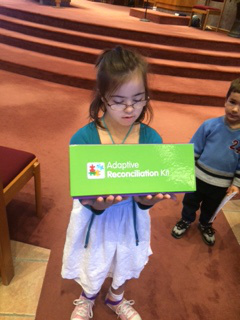
We didn’t have Christian’s phone handy to catch the squeal of excitement when she realized this was for her!
It’s That Year for Miss Julianna. Second grade.
If you’re not Catholic, you may not know what I’m talking about. But second grade is a big year, involving firsts of two major sacraments: Reconciliation and Eucharist.
In other words, it’s crunch time for this mama who’s been convincing everyone she knows what she’s talking about in teaching faith to kids. Child #1 did his sacramental prep work at school, so Christian & I only had to support the process. Child #2 is in public schools and there’s not time to do it in one hour a week at “church school.” So the prep work is all on us.
And then there’s that extra chromosome, which has implications for the “age of reason.” The idea is that kids should be capable of understanding what they’re doing before they receive the sacraments. (Well. Officially receiving the sacraments, that is. I learned that a good friend of mine, who happens to be a priest, served himself Communion well before he was supposed to, too. I take hope from that.)
I had some anxiety about whether we’d get resistance about having Julianna receive the sacraments this year. Her conceptual understanding is spotty, to say the least. On the other hand, who ever really understands? Even as adults, we receive the Eucharist with a sliver of belief and a hair of understanding, and all the rest is shaky faith. We only know that it changes us. That it fills some place inside, that we are incomplete without. That we hunger for it.
The Eucharist is very, very conceptual, but to Julianna it looks concrete. You hold your hands up, you have the host placed in your hand, you eat. Same with the cup.
But before First Eucharist comes First Reconciliation. And Reconciliation is all conceptual. How do you explain the concept of sin to a girl who answers the question “What did you do at school today?” with: “Good!” Let alone figure out how to surmount the difficulty of getting her to have a rational conversation with a priest without Mom or Dad there to act as go-between.
We have a new pastor this year at our parish, so I laid out the situation. He was very open; he gave me the go-ahead, and so now we’re deep in preparation work. It’s high time. I’ve always whispered in the kids’ ears about what’s going on at Mass, trying to help them connect with something that is over their heads, but let’s be honest. When you have four kids and one of them participates loudly and keeps herself occupied, it’s easy to let her do her thing and focus attention on the wigglers, the movers, and the shakers, who sometimes think church is a boxing ring or a LEGO construction (more accurately de-construction) lab. But that means she draws the short straw in faith formation. And when that same child has to have your help counting out every math problem, and every reading comprehension worksheet is a painstaking process, the your time and energy is often exhausted before you ever get to the point of doing faith formation at home, either.
But as with all things in the realm of parenting, when Mom and Dad decide it’s important, it happens. It’s happening now, and she’s so excited about it. I’ve been going through her Reconciliation book with her, a page or two at a time. I can see the big picture in the lessons, but I know when I was a kid I couldn’t, and if I couldn’t, then Julianna has no chance. She’s game, but she’s just along for the ride.
So it was like Christmas for both of us yesterday morning when the religious ed director walked into choir warmup and handed us a box that said ADAPTIVE RECONCILIATION KIT. I had to abandon my leadership role for a couple of minutes to get the box open and see what was inside. Julianna latched onto a set of picture cards to illustrate good choices and bad choices, and for a while, even at Mass, she wrapped her arms around that box and just hugged it.
It’s a good set, very visual, with a simplified act of contrition in pictures and “I’m sorry” cards” and an easy-to-read picture book that boils down the concepts and the procedures to their essence. We spent some more time with it yesterday afternoon. And now, at last, I feel like we’re on our way.
Updates to come as the year goes on.


October 16, 2015
Music Memory
 The spring of 1994 was a rough semester for me. It was my sophomore year in college, and in the fall semester, due to the convergence of a roommate who studied late into the night with the light on (causing me to sleep with my arms over my eyes, which made my neck & shoulder seize up) and clueless, focused practicing for a competition (which I won), I developed tendinitis and carpal tunnel. The spring semester was proving ground for figuring out how—and more fundamentally, if—I was going to be able to continue playing flute.
The spring of 1994 was a rough semester for me. It was my sophomore year in college, and in the fall semester, due to the convergence of a roommate who studied late into the night with the light on (causing me to sleep with my arms over my eyes, which made my neck & shoulder seize up) and clueless, focused practicing for a competition (which I won), I developed tendinitis and carpal tunnel. The spring semester was proving ground for figuring out how—and more fundamentally, if—I was going to be able to continue playing flute.
I spent most of that semester on piccolo, which I loathed, but got pretty good at, and truthfully it was less muscle stress so it was probably just as well. That semester also turned out to be the peak of my musical experiences in college & grad school, at least as far as repertoire. That was the semester we played both Scheherazade and Stravinsky’s Symphony of Psalms. (I got to play principal flute on that one. Wow, what a privilege.)
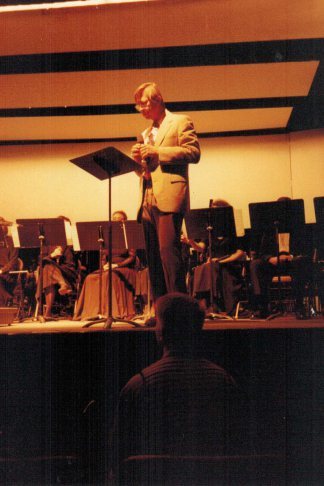
That’s me right behind his music stand, in the big skirt.
That was also the semester that David Maslanka came to campus. I played picc on his Third Symphony. (You can listen here, although that’s not us playing.)
This memory seems very close today, as Maslanka was in town again this week. I went to the university bands concert last night. Sitting again in that theater where I played opened up floodgates of memory. Looking down from the balcony and watching the drama that I used to be in the midst of, I got all emotional over ordinary things I haven’t forgotten, exactly, but that I almost never think about anymore. Things like tuning pitches (I’d forgotten it isn’t the oboe who gives that in the band). And the way the horn players turn their instruments over and over to clear out the spit when they have a long rest. I also saw things I never got to see before, because I was sitting in front. Maslanka’s music uses a staggering array of percussion, and watching the percussion players scurry from vibes to xylophone to glockenspiel in the space of six beats made me realize just how fabulous the percussion section in that wind ensemble must have been.
I remembered retreating to practice rooms to work pitch with another player on a section scored for two piccolos in perfect 5ths in the upper register. We wore earplugs. And on concert night, we nailed it. That part, anyway. I remembered the inspiration of having Maslanka there during rehearsals and wanting the concert to be absolutely amazing, and thinking it hadn’t been. I went up to him afterward and said, “I’m sorry, I don’t think that went very well.” He put a hand on my shoulder and regarded me with an amazed look as he said, “What concert were you just at?”
I started remembering things that went farther back, too. What it was like to to be dropped into this world, new and inexperienced. There are a lot of things they don’t tell you in advance, like when you’re in a band and the conductor comes on stage you stomp your feet as your welcome of applause, but in the orchestra you shuffle them instead. Why is that? I never knew, it was just something I learned on the fly. Other memories were painful, like the cringe of embarrassment I still feel when I remember how the conducting assistant asked us to check our name spelling on the personnel list on the wall, and since I was playing first I didn’t bother to look down the list, I only saw it wasn’t at the top, so I wrote it in, only to be told later that, duh, it’s in alphabetical order.
But most of all, I remembered what it is like to be in an ensemble like that, playing music of that caliber and emotional power. The way you are wholly in the moment and wholly aware of things happening in other parts of the stage, the way something magical can happen that lifts the entire experience to a transcendental level. I remembered another concert, when I wasn’t enjoying the music, so I told my parents not to bother coming. But that night something happened on the stage, something I hadn’t experienced in rehearsal. And as the last lingering note faded into silence, time seemed suspended. And into that silent eternity, my classmate, a bassoonist, whispered, “Wow.”
My life is crazy busy and I don’t often get a chance to dip back into the world I used to inhabit. This morning on the way to teach flute, I put on the cassette tape of that 1994 concert in the van, and Michael said, “Is that the band you used to live in?” Yes, sweetheart, I did live in that band.
Maslanka’s music reminds me that music can and should be a holy experience. Last night, the young man who plays trumpet in our church choir was on that stage, as well as a young lady with whom I played the hardest of my duets last spring. I was so grateful for the experience I knew they must have had this week, and I envied them the glorious beauty of what they were doing on that stage.
I started crying.
It was being moved by power of the music, but it was also the pang, the longing for what is gone. There are large ensembles I could join, but not ones playing at that level. And oh, how I miss it. Oh, how I miss it.


October 14, 2015
The Deep, Dark Underbelly of Parenting (and how my attitude is still my own problem)
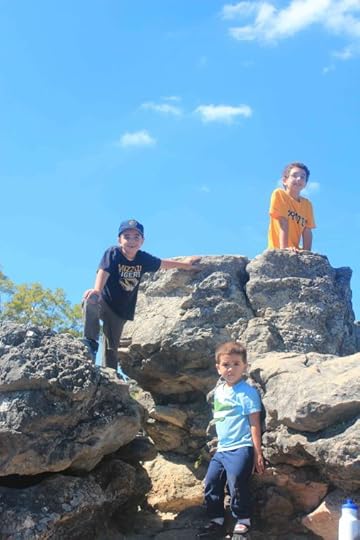
Give them rocks to climb and they won’t fight. Oh wait. They had that fight over the walking stick, didn’t they? Never mind…
I was driving home last night from Julianna’s last horseback riding lesson of the year, and pondering what to write for a blog post today, when I realized Julianna and Michael were in the back seat, fighting over…
…wait for it…
…a dirty paper plate.
This was not the first fight of the afternoon, either. Two hours earlier, Nicholas and Michael had a screaming match over who got to use the electric piano at the piano teacher’s house that included a tug of war over the headphones. And they snapped the cover off one of the headphones.
Fortunately, in this case I was able to snap the cover back into place, and no harm was done. But they got the full scolding, including the words not okay, not acceptable, and who has to pay for the things you break when you’re fighting?
Several things occur to me this morning, as I sit outside typing this and listening to Michael shriek, “JUWEEANNA, *I* AM THE LEADER!” while they ride bikes before school.
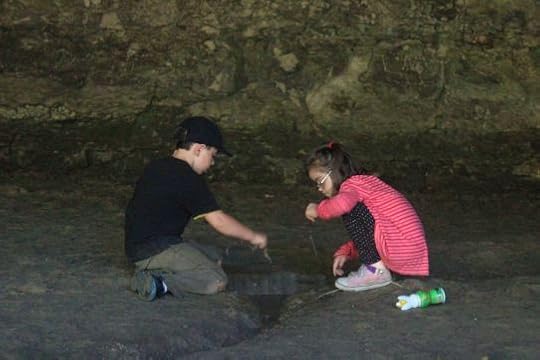
But if they work together to try to, say, dig a trench from the wall seepage to the creek, you might just get forty-five minutes of peace and quiet.
One: Michael has definitely hit the age where he’s no longer the victim of sibling oppression, but a full and willing participant.
Two: Often when I do presentations on Down syndrome I get the question about how my boys view their sister’s disability. These illustrations make it very clear that the younger boys, who were not partners in her early intervention therapy, see no difference at all. She’s fair game in every way that ordinary siblings are. She gets no free passes in the Sibling School of Hard Knocks.
Three, and the main point: having children is without a doubt a powerful reminder that I have to choose my attitude, because life will always, always be full of irritations and frustrations.
I frequently feel like pulling my hair out when my kids start bickering. It’s usually so petty. I mean, really. A dirty paper plate? There’s not even a good story behind that one. It really was just a dirty paper plate. And fighting over the electric piano? They actually both had good cause to consider themselves justified in wanting that instrument. Michael got to it first, but the purpose of the piano being there at all is so that kids waiting for their own lessons can practice, and Nicholas wanted to—gasp—use the piano for its intended purpose.
But it never occurred to them that there was any way to resolve their dispute other than PULLING APART SOMEONE ELSE’S ELECTRONIC EQUIPMENT?????????
Excuse me for a moment while I take a deep breath. Or twelve.
The danger in failing to acknowledge the icky underbelly of family life on a blog is that you give the impression that your life is all unicorns and rainbows, thus making others feel inadequate.
But the danger in focusing on said icky underbelly is that it’s really, really easy to start seeing nothing else. You start thinking that your kids are going to grow up to be sociopaths, when in reality there are indications to the contrary. For instance:
A week ago, Christian dropped Julianna and me off at church on Wednesday night so she wouldn’t be late for “church school,” and then he took the boys and went to fill up the van with gas. The gas station happened to be next door to Taco Bell, and nobody had had dessert, so Christian decided to get them some of those amazing cream cheese-stuffed fried whatevers. And Nicholas put a check on Alex, who wanted to finish them, by saying, “But what about Julianna? Julianna didn’t get any.”
It’s hard to accept the self-absorption of young childhood, especially when your whole life is structured around meeting their needs ahead of your own. It doesn’t really matter how many times the experts tell you it’s normal. It always chafes. And that chafing draws attention to itself, to the point where sometimes you fail to recognize—or choose to ignore—the sweet moments, and cling to the problems.
When all those parenting surveys show how “less happy” people are after they’ve had kids, I think it is more an indicator of our own attitudes, which are, let’s face it, entirely in our control. Bad things happen. That doesn’t mean it has to ruin your entire life.
Thus concludes my daily self-pep talk. How about a funny Nicholas school paper?
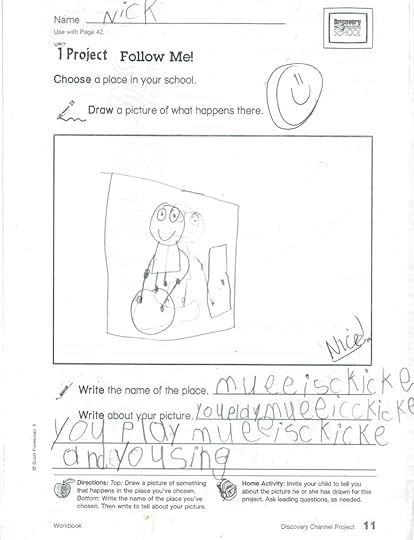
That mile-long word? “Music.”


October 12, 2015
What We Did This Weekend
It has been a long time since I’ve had a week (and weekend) as intense as the last has been. All good things, but intense. I’ve done almost no writing for the past week. So I’m giving myself a pass on being profound this morning. Instead I’ll share what we did this weekend in pictures…so I can devote today to catching up!


October 9, 2015
The Trouble With Shoes
Girls are supposed to be into shoes. Right? That’s what I hear, anyway. I’m kind of an outlier. I have plenty of shoes, mind you, but nothing, nothing like most women. Having sold shoes for a couple of years, I’m all about function and proper support, which (let’s be honest) most women’s shoes are neither. If the shoe manufacturers of the world had only people like me, they’d go out of business.
My daughter is another story.
If it’s pink and feminine, you can bet she’ll love them. One year, we gave her black knee-high boots for Christmas. You would have thought the heavens had opened, she was so excited. It was our one and only unqualified success in buying gifts for Miss Julianna…ever. She goes around pointing out shoes with Anna and Elsa on them. Shoes that sparkle. Shoes that are black and dressy.
Any sort of shoes, in fact, that are unlike hers. Because this is what Julianna gets to wear:
You see, if Julianna doesn’t wear her hard plastic, non-breathable ankle brace, she walks on the inside of her feet. I don’t mean flat footed. I mean that she practically walks on that bump on the inside of her ankle. It’s caused by the hypotonia (low muscle tone) that is part and parcel of Down syndrome, but very few of the kids I know who have DS have anything approaching this severe a pronation.
The PTs and orthotists have tried various shoe inserts over the years, but we seem to have settled on the “Sure Steps” brace:
The problem? Well, there are a few. #1, they don’t breathe, and she has to wear them all the time, so I worry about what’s going to happen to her feet when she gets a little older, with the constant moisture and heat. #2, when you only have one pair of shoes, that must be worn every single day, it’s kind of a Thing when they get lost. And Julianna’s forever losing things.
What’s that? Why only one pair? Well, that brings me to #3: They are Really. Expensive.
As in $1400 a pair.
I know this number because we got a bill for them a few weeks ago.
Now, up until this year I have sung the praises of our health insurance, because they kindly and without fuss paid for these inserts. There was so little drama about it that I didn’t realize until a year ago how important these inserts really are. The story goes like this: if Julianna walks on the inside of her feet, she will so badly stress her bones that they will eventually have to be surgically broken and copious amounts of PT undertaken in order to be able to walk, well, really at all. And eventually she’ll be wearing custom-made “clown shoes.”
It seems a no-brainer to me that her Sure Steps, then, fit squarely under “preventive health care.”
But apparently, beginning this year, the great insurers do not concur.
Those who have been through an insurance battle before can imagine what we’ve been going through. Conversations with the provider. Conversations with HR representatives. Conversations with the insurance company. Extra doctor appointments to try to come up with a code that the insurance company will accept. And, because this is too big a bill to leave to chance, conversations with the local organization that provides funding to people with disabilities.
We got the new shoe inserts in late June. We learned in August that the claim had been denied (twice), despite the fact that the company had bought her at least four pairs before. And now, the saga of claims and appeals and arguments seems poised to drag most of the way to Christmas.
This is one of those things about raising a child with a disability that never quite becomes ordinary, no matter how long you live with it. The fact that she can only wear flat-bottomed, largely treadless skateboarder shoes without a deep cutout in the sole is a constant frustration to me, because there are so few things in the world we can give her as gifts, and pretty shoes are one of them–yet virtually every single one of those pretty pairs is off limits to her.
I’m not complaining, per se, but simply acknowledging part of our reality. This is one of those concrete examples of the support needed by families after a child with a disability comes along–the reason I challenge people who call themselves pro-life to think beyond the womb. The “up side of Downs” is a major focus of mine, but it seems only fair in a month dedicated to Down syndrome awareness to spend a few minutes acknowledging the pain-in-the-neck stuff that we deal with, too.


October 7, 2015
The Complicated Relationship Between Gifts and Pride

Photo by AndrewDallos, via Flickr
I was a really awkward child. I was forever saying the wrong thing. I was constantly misunderstanding people. I was hopelessly gullible, easily manipulated and hamstrung by my good intentions. I was a little too blunt and a little too analytical, with just enough social skills to know when I’d put my foot in it but not enough to do anything about it. And hopelessly introverted, so I felt it all keenly.
I haven’t entirely outgrown these tendencies, but I’m much better than I once was. And so it seems strange to me that public speaking has become such a part of my life. This week, for instance, my docket includes:
leading choir rehearsal
talking to health professions students about Down syndrome
coordinating a Down syndrome presentation in Julianna’s school
being interviewed on the local radio station about my flute recital-benefit
speaking to the audience at said recital; and
speaking to the priests of our diocese about natural family planning.
Last night’s presentation to the priests was kind of a big deal, and I had a lot of anxiety about it. If the list doesn’t give it away, it’s been freaking insane kind of busy the past few days, and there weren’t enough minutes in the weekend to practice as much as I wanted to. But in the end, the Holy Spirit really stepped up to the plate, because things went better than I could have hoped.
And so, on my long late-night drive back home, I was basking in the glow, until I realized I was more focused on how great a job I had done, and not enough on the prayers of everyone behind me and the touch of the Spirit that deserved the greatest credit.
It’s so easy to sprain your ankle on pride.
Given my checkered, awkward history, it is gratifying to feel like I’m capable of speaking to people and making a difference in the world. I know that the gifts God has given me are meant to be used in his service, and in the service of his children.
But it’s appallingly easy to slip into a narcissism that enjoys its own wit a little too much.
I would imagine that the complicated relationship between pride and the gifts and charisms we’ve been given is something that every person struggles with. But when that relationship plays out in public spaces, it seems to take on a little more urgency.
I have come to accept, grudgingly, that humility and pride are two sides of the same coin in my heart. I strive to talk myself down from pride, but when opportunities for true humility are forced upon me, I gnash my teeth. It’s just the nature of the beast, I guess. But when I see people who approach the public display of their gifts with grace and humility that seems effortless, I wonder if they, like me, are engaged in a struggle they try to keep hidden from the rest of the world. Or are they truly what I aspire to be, but fear I never will: genuinely humble people?


October 5, 2015
Julianna’s Love Affair With Richard The Horse
The first time she saw this horse, eighteen months ago, she screamed. They lifted her up onto his back, and she screamed. And screamed. And screamed. It went like this for the first 2 1/2 lessons, until someone thought to sing. “A Spoonful of Sugar” changed everything. She fell in love with “Richard Horse” almost immediately, and talks about him during all the long weeks of the year when she does not have horseback. Her first day of horseback last spring, she told the people on the bus that she was going to go ride a purple unicorn named Richard.
So today I thought I’d share Julianna’s latest equestrian accomplishments.
Click to view slideshow.


October 2, 2015
The Challenge of Julianna’s Charism
She comes into our rehearsal space every week at eight p.m., walking her cute side-to-side walk and shouting, “Mommy, guess what I have! Guess what I have!” On choir nights, the boys go to the parish nursery to hang out with an amazing woman, a schoolteacher who volunteers her time so we don’t have to pay a sitter for the privilege of volunteering ours. But Julianna, because she’s in public school, goes to “church school” on Wednesday nights. And afterward, she comes to us.
She tries to sing, which is usually adorable and almost always hard on the choir’s ensemble, because she’s louder than all of them and she only occasionally tries to hit the right pitches. And sometimes, she does this:
I am always torn by this half hour of my week. We are the kind of parents who impose pretty strict behavioral standards upon our kids, especially in public. We don’t want them inconveniencing or annoying other adults. In direct conflict to this is my belief that if kids aren’t actually doing something wrong, you shouldn’t yell at them. Sometimes we yell at kids because what they’re doing embarrasses us, or makes us feel self-conscious as parents—but it’s not actually wrong.
But sometimes, I worry that we allow too much of a double standard for Julianna. I’d like to tell you that I expect exactly the same level of behavior from her as I do from her typically-developing brothers. But that would be a lie. She is different. And her charism, her ability to connect with people and minister to them, demands that we allow her to do things we would find socially unacceptable if she didn’t have Down syndrome. Things like walking up to complete strangers and introducing herself. Things like a total lack of inhibitions about asking for exactly what she wants. Like for instance, those college kids’ walking sticks, last Saturday at the Pinnacles, or a share in that toddler’s Goldfish crackers.
She is an ambassador for Down syndrome–a high-functioning, cute little girl with a silvery giggle and more charm in one folded ear than most of us have ever possessed in our entire lives. We’ve made a conscious choice to give her a lot of rein because we know how little personal contact most people have with disability, and how that lack of personal contact renders a prenatal diagnosis, for instance, a thing of paralyzing terror. We’ve given her free rein because we want her to witness to the world that Down syndrome isn’t a death sentence or even a life sentence in a prison of anguish–that it can be a life overflowing with joy.
We think that’s an important thing for the world to experience, and Julianna is well-suited to the task.
And yet there must be a line. What endears her to people at two, five, or eight is sooner or later going to render her insufferable. That was brought home to me when, barely two days after I rhapsodized about how everyone loved her off-key, loud singing, someone made a comment that told me I was wrong: not “everyone” loves it.
So on Wednesday night, when she sidled into the crowded music area and took up position right in front of me to conduct the choir herself, I felt simultaneously an overwhelming love and a writhing, cringing embarrassment. Where is the line?
As is often the case–my blog is my own personal therapist, I think–I don’t have a pat answer. Only this insight: We loved it when toddler Alex said “pu-wanio” instead of piano and “hec-a-cot-ta-ter” instead of helicopter and “hosapopo” instead of hospital. I gloried in it and I let him mangle the words until he got old enough that I thought he might start getting made fun of, and then I taught him how to say them correctly. There was a bit of grief in that process, but I didn’t regret it.
Lately Julianna has begun to prove that she can sing on pitch if she sings softly, which is to say, not at a deafening volume. (She likes for me to lie down with her and sing “Stay Awake” from Mary Poppins at bedtime, and sometimes she sings with me.) So we are thinking that after Christmas we may find someone to give her voice lessons—at least, long enough to encourage her to sing appropriately.
And I have to trust that in the same way, the opportunities and the appropriate time to redirect other things will make themselves clear in time.


September 30, 2015
My Little Hero
A little boy comes to me tiptoeing in a whisper, half an hour earlier than he should have been up from nap.
“What are you doing up?” I ask from my writing corner.
“You need to put that away because I want to snuggle with you,” he said.
And so I lean forward and set my computer on the bed, because how do you resist a sweaty little boy head and big brown eyes? He settles in on my lap for about two seconds, and then he starts wiggling. “I have to put my gun away,” he says. With a heavy, dramatic sigh, he slides his hand down the pocket of his shorts and then settles back in. “I have to look for bad guys,” he tells me as he rests against my chest, looking up with big earnest eyes.
“Well,” I say, “there aren’t any bad guys here. Bad guys don’t hang around mommies who snuggle little boys.”
He gives me a look that says, Mom, you and I both know you’re full of it. But he burrows in anyway, and for a few minutes, I get to snuggle my little hero.

















